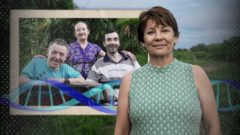Geneticist Silvana Santos' research in Serrinha dos Pintos, a small Brazilian town with prevalent cases of Spoan syndrome, sheds light on the genetic disease affecting many local families due to cousin marriages. Her work, aimed at understanding and managing genetic risks, highlights the intertwined social fabric of this isolated community.
Unraveling Spoan Syndrome: A Rare Disease in a Close-Knit Community

Unraveling Spoan Syndrome: A Rare Disease in a Close-Knit Community
In the remote town of Serrinha dos Pintos, geneticist Silvana Santos uncovers the cause of Spoan syndrome, revealing the complexities of genetic inheritance amid familial ties.
The small town of Serrinha dos Pintos in northeastern Brazil has recently gained attention for its striking health issue, affecting the mobility of many children in the area. With a population of fewer than 5,000, this remote locality has witnessed a troubling trend of young residents losing their ability to walk due to a rare genetic disorder identified as Spoan syndrome. This condition was uncovered by biologist and geneticist Silvana Santos, who began her groundbreaking research over two decades ago.
Before Santos introduced her findings, the families in Serrinha had no answers for the mysterious illness plaguing their children. Spoan syndrome is caused by a genetic mutation affecting the nervous system, which manifests symptoms only when both parents carry the altered gene. Santos's research culminated in the first documented account of Spoan globally, significantly benefiting affected families through the establishment of awareness, resources, and support.
Santos’s personal connection to Serrinha is noteworthy—many of her São Paulo neighbors hail from this town, sharing familial links that often lead to cousin marriages. This cultural practice is emblematic of Serrinha’s demographic reality, where geographical isolation has led to high rates of related couples. While cousin marriages globally are estimated at about 10%, they can be as high as over 50% in some countries, including Pakistan. Experts warn that such relationships can pose an increased risk of genetic disorders.
More than 30% of couples in Serrinha share blood relations, and a troubling proportion of them have children with disabilities—a ratio that Santos sought to address through her dedicated study. Her field research journey began with DNA sample collection and conversations with locals, evolving into years of hard work that ultimately led to identifying the genetic mutation responsible for Spoan.
The ramifications of this discovery resonate deeply within the community. The condition, often leading to severe physical limitations and ultimately full dependency on caregivers as patients age, was historically referred to as "crippling." With the acceptance and acknowledgment of Spoan, there has been a shift in language and a better understanding of the associated health challenges.
Currently, a new research initiative aims to screen 5,000 couples in Serrinha for genetic markers tied to recessive diseases, supporting couples in understanding potential risks tied to their family ties. The ongoing objective is not to discourage cousin marriages but rather to foster informed choices regarding genetics.
Through her distinguished career, Santos has become a pivotal figure in not just diagnosing and researching Spoan syndrome but also in contributing to the lives of those affected. Although she no longer resides in Serrinha, she remains invested in the community, nurturing the relationships formed through her rigorous work and inspiring a hopeful path for families facing the realities of inherited conditions.








